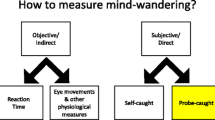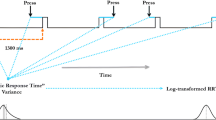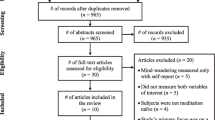Abstract
Researchers suggest links between mind-wandering and impaired processing of external task stimuli: mind-wandering results in perceptual decoupling. The primary methodology employed to investigate the effects of mind-wandering requires people to report their conscious state and then predicts prior behavior or neurophysiological responses using the person’s self-report. Unfortunately, this method employs reports that occur after the behavior occurs. An alternative methodology employs a word displayed prior to a performance check or catch trial. After the catch trial, participants then report their awareness of the word occurring, attempt to recognize the word, and also report whether they were on- or off-task. We show that participants’ explicit and implicit awareness of the pre-catch trial word is independent of self-reports of conscious state. This finding conflicts with the perspective that mind-wandering reports indicate perceptual decoupling. Reports of mind-wandering may alternatively be how people explain behavioral outcomes.

Similar content being viewed by others
References
Antrobus JS, Singer JL, Greenberg S (1966) Studies in the stream of consciousness: experimental enhancement and suppression of spontaneous cognitive processes. Percept Mot Skills 23:399–417
Bem DJ (2011) Feeling the future: experimental evidence for anomalous retroactive influences on cognition and affect. J Pers Soc Psychol 100:407–425
Bradley MM, Lang PJ (1999) Affective Norms for English Words (ANEW): stimuli, instruction manual, and affective ratings (Technical Report C-1). University of Florida, Center for Research in Psychophysiology, Gainsville
Carter L, Russell PN, Helton WS (2013) Target predictability, sustained attention, and response inhibition. Brain Cogn 82:35–42
Casner JM, Schooler JW (2013) Thoughts in flight: the relationship between automation use and professional pilots’ task related and unrelated thought. Hum Factors 56:1–10
Cumming G (2013) The new statistics why and how. Psychol Sci 25:7–29
Franklin MJ, Smallwood J, Schooler J (2011) Catching the mind in flight: using behavioral indices to detect mindless reading in real time. Psychol Bull Rev 18:992–997
Gilbert SJ, Dumontheil I, Simons JS, Frith CD, Burgess PW (2007) Comment on “Wandering minds: the default network and stimulus-independent thought”. Science 317:43b
Handy TC, Kam WY (2015) Mind wandering and selective attention to the external world. Can J Exp Psychol 69:183–189
Head J, Helton WS (2013) Perceptual decoupling or motor decoupling? Conscious Cogn 22:913–919
Head J, Helton WS (2014) Sustained attention failures are primarily due to sustained cognitive load not task monotony. Acta Psychol 153:87–94
Killingsworth MA, Gilbert DT (2010) A wandering mind is an unhappy mind. Science 330:932
Klein TA, Endrass T, Kathmann N, Neumann J, von Cramon DY (2007) Neural correlates of error awareness. Neuroimage 34:1774–1781
Mack A (2003) Inattentional blindness looking without seeing. Curr Dir Psychol Sci 12:180–184
Mason MF et al (2007) Wandering minds: the default network and stimulus-independent thought. Science 315:393–395
McAvinue L, O’Keeffe F, McMackin D, Robertson IH (2005) Impaired sustained attention and error awareness in traumatic brain injury: implications for insight. Neuropsychol Rehabil 15:569–587
Morey RD, Rouder JN, Verhagen J, Wagenmakers EJ (2014) Why hypothesis tests are essential for psychological science a comment on Cumming (2014). Psychol Sci 25:1289–1290
Robertson IH, Manly TJ, Andrade J, Baddeley BT, Yiend J (1997) Oops!’: performance correlates of everyday attentional failures in traumatic brain injured and normal subjects. Neuropsychologia 35:747–758
Schneider W, Eschman A, Zuccolotto A (2002) E-Prime user's guide. Psychology Software Tools Inc., Pittsburgh
Smallwood J, Davies JB, Heim D, Finnigan F, Sudberry M, O’Connor R, Obsonawin M (2004) Subjective experience and the attentional lapse: task engagement and disengagement during sustained attention. Conscious Cogn 13:657–690
Smallwood J, Fishman DJ, Schooler JW (2007a) Counting the cost of an absent mind: mind wandering as an under recognized influence on educational performance. Psychon Bull Rev 14:230–236
Smallwood J, McSpadden M, Schooler JW (2007b) The lights are on but no one’s home: meta-awareness and the decoupling of attention when the mind wanders. Psychon Bull Rev 14:527–533
Smallwood J, Beach E, Schooler JW, Handy TC (2008) Going AWOL in the brain: mind wandering reduces cortical analysis of external events. J Cogn Neurosci 20:458–469
Thomson DR, Seli P, Besner D, Smilek D (2014) On the link between mind wandering and task performance over time. Conscious Cogn 27:14–26
Thomson DR, Besner D, Smilek D (2015) A resource-control account of sustained attention evidence from mind-wandering and vigilance paradigms. Perspect Psychol Sci 10:82–96
Weissman DH, Roberts KC, Visscher KM, Woldorff MG (2006) The neural bases of momentary lapses in attention. Nat Neurosci 9:971–978
Author information
Authors and Affiliations
Corresponding author
Rights and permissions
About this article
Cite this article
Head, J., Helton, W.S. The troubling science of neurophenomenology. Exp Brain Res 236, 2463–2467 (2018). https://doi.org/10.1007/s00221-016-4623-7
Received:
Accepted:
Published:
Issue Date:
DOI: https://doi.org/10.1007/s00221-016-4623-7




